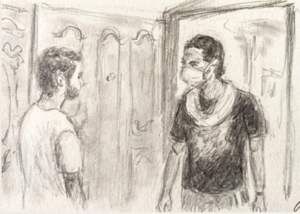Yemeni doctor’s heart-wrenching COVID diary
A Yemeni doctor working on the frontline of his nation’s COVID-19 battle has penned an extraordinary diary painting a compelling picture of his work among people struck down by the pandemic, many of them migrants and refugees.
Dr Ammar Derwish has chronicled how the disease spread, the strange symptoms some patients presented with; and what he did to care for them.
 He also tells what it was like as he himself fell ill in the midst of Ramadan.
He also tells what it was like as he himself fell ill in the midst of Ramadan.
“I never expected to see what is happening right now, here in Aden,” the 32-year-old medico writes.
“The situation is insane. People are falling down, one by one, like dominoes,” Dr Derwish wrote.
Humanitarian website TNH worked with him to turn his notes into a multimedia diary.
Even before the COVID-19 pandemic struck’ Yemen was regarded to as both the world’s greatest humanitarian crisis and its most forgotten.
Dr Derwish’s diary gives a sense of how the pandemic plays out in a place with little electricity and a crippled healthcare system.
Yemen has already been through more than five years of war. Four out of five Yemenis, or more than 24 million people, need humanitarian assistance and 20 million people cannot get enough food to eat.
Yemen’s economy has disintegrated and half the country’s hospitals and health facilities have been destroyed in the fighting. With a population weakened by poverty and malnutrition, and many living in unsanitary and overcrowded conditions, physical distancing and regular handwashing is virtually impossible.
And despite the conflict, conditions in the surrounding region are so poor that more than 275,000 refugees and asylum seekers have sought refuge in Yemen, in recent years, fleeing violence and persecution in Somalia and Ethiopia.
Dr Derwish’s diary highlights how vulnerable Yemen was, and is, to the COVID-19 outbreak.
“I never thought that my notes would make a difference to anyone,” he says in introducing his diary.
“I still believe they might not. But I want to share this experience. Maybe some people care?” Dr Derwish said.
See Dr Darwish’s diary here:












